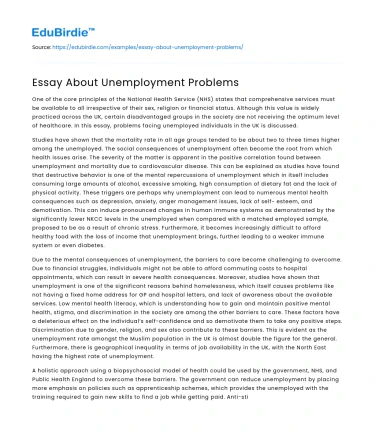One of the core principles of the National Health Service (NHS) states that comprehensive services must be available to all irrespective of their sex, religion or financial status. Although this value is widely practiced across the UK, certain disadvantaged groups in the society are not receiving the optimum level of healthcare. In this essay, problems facing unemployed individuals in the UK is discussed.
Studies have shown that the mortality rate in all age groups tended to be about two to three times higher among the unemployed. The social consequences of unemployment often become the root from which health issues arise. The severity of the matter is apparent in the positive correlation found between unemployment and mortality due to cardiovascular disease. This can be explained as studies have found that destructive behavior is one of the mental repercussions of unemployment which in itself includes consuming large amounts of alcohol, excessive smoking, high consumption of dietary fat and the lack of physical activity. These triggers are perhaps why unemployment can lead to numerous mental health consequences such as depression, anxiety, anger management issues, lack of self- esteem, and demotivation. This can induce pronounced changes in human immune systems as demonstrated by the significantly lower NKCC levels in the unemployed when compared with a matched employed sample, proposed to be as a result of chronic stress. Furthermore, it becomes increasingly difficult to afford healthy food with the loss of income that unemployment brings, further leading to a weaker immune system or even diabetes.
Due to the mental consequences of unemployment, the barriers to care become challenging to overcome. Due to financial struggles, Individuals might not be able to afford commuting costs to hospital appointments, which can result in severe health consequences. Moreover, studies have shown that unemployment is one of the significant reasons behind homelessness, which itself causes problems like not having a fixed home address for GP and hospital letters, and lack of awareness about the available services. Low mental health literacy, which is understanding how to gain and maintain positive mental health, stigma, and discrimination in the society are among the other barriers to care. These factors have a deleterious effect on the individual’s self-confidence and so demotivate them to take any positive steps. Discrimination due to gender, religion, and sex also contribute to these barriers. This is evident as the unemployment rate amongst the Muslim population in the UK is almost double the figure for the general. Furthermore, there is geographical inequality in terms of job availability in the UK, with the North East having the highest rate of unemployment.
A holistic approach using a biopsychosocial model of health could be used by the government, NHS, and Public Health England to overcome these barriers. The government can reduce unemployment by placing more emphasis on policies such as apprenticeship schemes, which provides the unemployed with the training required to gain new skills to find a job while getting paid. Anti-stigma campaigns and raising awareness about mental health services can be used to tackle both social and mental aspect of the unemployment issues. This was evident in placement at my mental health clinic when an unemployed patient talked about the positive impact of the Minds Matter services on his wellbeing. Additionally, a training program can be designed for healthcare professionals on how to provide the best healthcare to specific disadvantaged groups in society.






 Stuck on your essay?
Stuck on your essay?

